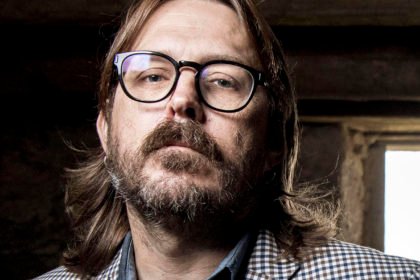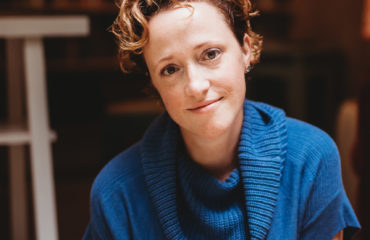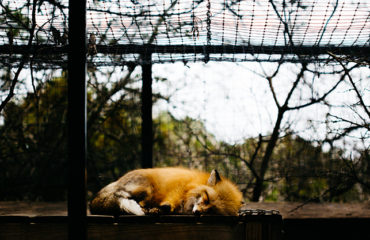SILVER LINE by Christian Kiefer

I had been afraid of the cold silent body I held to my belly but when we at last reached the engine and clambered up the frozen metal ladder and into the relative warmth of the interior, the child jerked awake and began to wail, a thin, gasping sound that bit directly into my heart. Alive. The babe was still alive.
How long I had been outside in the blizzard I did not know; it could not have been more than five or ten minutes and yet I was shivering with cold. The baby’s parents were entirely soaked through, the girl’s lips a faint, pale blue. The young man had found the heater and stood before its orange filaments, rubbing his hands. His eyes looked wild, hair matted to the shape of his skull, teeth clenched down in his jaw. Jeans and a thin denim jacket. At his feet rested a shapeless knapsack, soaked through and dripping.
“Blanket up there,” I said to the girl.
She reached for it and when she made no move to take the child from me I nodded down into the well of my coat. “She’s OK,” I said.
Still the girl said nothing. Probably no older than sixteen or seventeen, her clothes utterly insufficient for the weather: a thin sweater, threadbare skirt, canvas shoes still caked with ice and snow. When she looked up at me through her lank hair, her hollow eyes spoke only of exhaustion.
“You’ll need to take her,” I said “I gotta get this thing moving.”
Only then did she step forward, hesitantly, as if unsure of what I meant to do, but she took the child. That warmth moving away from me.
Then I was at the controls again and the engine took up its growl and began to slide forward. Relief that it had not frozen to the rails. “Coffee in that Thermos there,” I said over my shoulder. Later I said my name.
“Tommy,” came the response from behind me. “And here’s May.”
The plow was moving and I had cranked up the engine to regain its speed, the whole machine vibrating with barely restrained fury. “You might all’ve froze,” I said.
“I think we did,” Tommy said.
As if in response, the baby resumed its mewling cry. I did not turn. “Girl or boy?” Beyond the window glass: the onrush of snow.
May’s voice was small and thin. “Jilly,” she said.
“Little Jilly,” I said.
“No,” she said. “Just Jilly.”
A child with a child, I thought.
* * *
After my crack-up, they took me off freight and assigned me to the plow engine where there was almost no chance I would see a single living soul on my runs back and forth across the pass. In the first years on the mountain, I could still sometimes see the girl I had killed, her body turning to meet the engine as if greeting a friend. Martha Evans had been twelve years old on the bright spring afternoon that my locomotive had dismembered her and although I knew—and had been assured over and over—that her death was in no way my fault, the vision of her continued to haunt me. I had lifted the pieces of her from beside the tracks and under the freight cars and had set them next to the locomotive in some approximation of her living shape as if she were a doll that only needed stitched back together.
In the weeks and months that followed, I wanted only to be left alone. It did not seem too much to ask and indeed my coworkers and dispatcher were kind enough to give me that much and to keep me employed when I probably should have been let go, my dependence on alcohol being such that I could not much be trusted around heavy equipment. And yet the plow had provided a way back for me, the locomotive’s handling requiring all my skill as an engineer and its blade producing an effect that was tangible and immediate. The way before was obscured by hissing snow and the great spreader blade did its work so that my path was marked by clean silver lines of track that extended on into the darkness, ready for whatever train was next to come.
My solitude had felt like penance at first, the little girl’s unconcerned gaze staring back at me from around each bend in the rails, but that too faded with time until my loneliness came to feel more like meditation than anything else, the blurred snow outside the glass swirling and the train invisible under its flow such that I oft felt as if I had become wholly untethered from the world of men. I could read the hidden topographies of that trackless snowfield as if all of it were part of my body: turns and twists and wildly descending slides and hard uphill climbs.
And then you. And everything to come after.
* * *
The headset lay crackling on its little hook and I placed it upon my head again, its pads against the flesh of my ears.
“What’s that do?”
Tommy had come up next to me and stood now strangely close in the tight space at the head of the engine, his finger pointed to the headset.
“Keeps me in touch with dispatch,” I told him. “How’d you get out there anyway?”
“What’s that mean?”
“What?”
“Dispatch.”
“That’s kind of like my home office. Gotta check in now and then.”
He did not respond for a time. I did not know if he watched me or watched, as I did, the onrushing snow through the window. Then he said, “Got stuck on the road is all.”
“Isn’t the highway closed?”
“Weren’t on the highway.”
“On a side road?”
“You ask a lot of questions, mister,” he said simply.
“Just making conversation.”
Throttle back. The spreader vibrated and I brought it up and alongside. The forest seemed to roll out under us like a great wave and we upon it, barely in control.
“You’re dang lucky I saw you.”
“That was May. She was waving.”
“Lucky she did. I almost didn’t stop.”
“Why not?”
At first I did not speak. Because of Martha Evans, is what I wanted to say. Instead I told him that I was not sure what I had seen. “Thought it was an owl,” I said.
“An owl?” He turned toward the back of the engine. “You hear that, May-May? He thought you were an owl. Hoot hoot!”
“Yep, hoot hoot,” I said. And then, loud enough that I hoped May could hear me: “Better get hold of something. We’re gonna get a little fast through here.”
“How fast?” Tommy said quietly.
“Fifty or sixty.”
“That doesn’t seem fast,” he said.
But then the hidden tracks pulled over the lip and the train tipped forward, the lights illuming a rushing flood of snow and forest, a whole topography of surprised motion. Tommy let out an audible gasp as we descended that wild loop.
“She all right?” I called to him. I did not take my eyes off the swirling window glass and when he did not answer I called to him again, the same words, the same question.
“Who?” he said at last.
“May,” I said.
“She’s fine,” he said but I do not think he so much as looked toward the back of the engine. The lever forward against the weight of my palm. Oh how I throttled into that deep dry powder like some great knife and how it flew, flew away into the darkness of the forest all around, the tracks clean and pure and silver in my wake and already the engine beginning, once more, to rise. The grace of that movement. The secret joy.
“Boy that’s something,” Tommy said. “How’d you get a job like this?”
“Kind of happened into it.”
“You already knew how to drive this thing?”
“They trained me,” I told him. “Didn’t know a thing when I started.”
“Lucky,” he said.
“Could be,” I admitted. “I just kind of stuck with it, you know.”
The train heaved against the uphill run. Edge the throttle forward. A bit more.
“You can run this all by yourself?” Tommy asked.
“There’s a rotary if it gets much worse than this,” I told him. “That one takes a whole crew. This one here’s pretty simple, really.”
“How’s that?” he said.
I gave him the basics then. To this day I do not know why; perhaps simply because he was there in the locomotive with me. It still felt a kind of miracle I had seen her waving hand and had stopped and had found them, shivering in the snow, a little family: man, woman, and child. I had taken the baby from her so quickly, an action totally without conscious thought, and had tucked it into my jacket in the blowing snow and had told them to follow. It had felt so cold against my chest, my belly. Martha Evans’ severed legs had been warm, almost hot. How her mother had screamed in the station office. I had sat there weeping in the cracked Naugahyde chair as the station manager tried to calm her but I wanted her to keep going, to break all the windows with her screams, to shake me to powder.
I placed Tommy’s hand on the tiller. On the throttle. On the brake. He asked what to look for and I showed him. The drift that might secret the great bulk of a tree within its frozen milky shape. The way to read the track. How to lean the whole engine into a curve so that the force of the plow continued into the heaving snow without cease. How to throttle back in a downhill run and when to throttle up for the momentum to ride the next rise.
It was then my dispatcher’s voice came through the headset. “Hang on,” I said to Tommy. “Dispatch this is Thirty-Two. I hear you, Donna.”
Her voice was a loud tinny squawk in my earpiece. She asked me how it was looking, the storm. “Looks like a blizzard,” I said.
“You hit eight-two yet?”
“Not quite. Just through Yaw’s,” I told her.
“Runnin’ slow?”
“A bit.”
I glanced over at Tommy and found, to my surprise, that he was no longer staring out the windows of the train but was, instead, staring at me, his expression like a cold spear of ice running along my spine. What that gaze meant or might have meant I could not guess but for the first time I wondered who it was that I had welcomed into my engine. Donna was still speaking but her voice sounded far away now. Through it I could hear May’s voice, although it was not nearly so loud: “Tommy,” she whispered, “don’t do nothin’. He’s been nothin’ but kind. That’s all.”
There was a pause. Tommy’s face showed no emotion whatsoever, just that cold staring, as if the visage of an animal. Then May again, louder now: “Mister,” she called. “Just don’t say nothin’ about us. Please, mister. Just don’t.”
Donna, in my ear: “You still read?”
“Yeah, Donna,” I said. “Everything’s A-OK.”
A few more forced pleasantries and then I set the headset back on its hook. “What’s this about?” I said, trying to sound pleasant, trying to sound, that is, as if May’s words had not brought a tingle of fear to my gut.
“You just mind your own business.”
“You in some kind of trouble?”
“I said mind your own goddamn business.”
The baby had started to mewl again and now its voice spiraled up in a long howl of anguish.
“Goddammit, May,” Tommy yelled. “You make her stop!”
May had begun bouncing the babe against her, her face leaning down to shush it, a kind of wild heat in her movements.
“Goddammit, May,” Tommy said. “I’m warning you. You make her stop right goddamned now or I swear to God I’ll throw her right off this goddamned train.”
“OK,” I said now. “Let’s just take a breath.”
He swung at me so quickly that I had no time to react, the impact of his fist upon the side of my head swift and violent and without warning. I looked up from the floor into the space where he had been. Just before me hung the torn bare wires of the headset. My ears rung. Tommy and May were far away, across the open space of the car, Tommy shouting something and May cowering under the lash of his words.
I clambered to my feet again, peered out the window, lay my hands on the controls and then removed them again and turned to face Tommy and May at the back of the train. My heart clenched hard in my chest. A rivulet of panic.
“He doesn’t know anything,” May was whispering. “Please Tommy. He doesn’t know. He doesn’t.”
“He sure as shit knows something now, though. Don’t he?” He spun and looked at me.
I put my hands in the air. “Just minding my own business,” I said, although that seemed a hollow, cowardly claim after I had been struck and knocked down. When I turned back to the tracks, to the storm, my hands were shaking. So dark outside that the headlight beam was a cut hole in the shifting texture of the night. I tried to steel myself against what was to come but there was only my fear like a great avalanche cascading down through all parts of me at once.
After I had put Martha Evans’ body together I had crawled up into the engine and curled into the corner and fell asleep there. It was a strange response, I know. It might have been that I thought it all a dream and that I might trick myself into waking from it were I to will myself asleep. But I awoke to all manner of police and officials and it was no dream and never had been.
“Where’s this train go, mister?” Tommy had come up next to me again and put his face up near my still-ringing ear.
“Switch yard’s in Camperville,” I said. “I could get you there easy.” My voice sounded filled with stones. This was no dream either. I had learned that much at least.
“How far’s that?”
“Three hours.”
“Then where?”
“After Camperville it goes on northeast.” Behind us the baby had taken up its crying again. I could hear May’s voice trying to quiet her, shushing, whispering, a muffling to the baby’s sound that might well have been her hand over that tiny mouth.
“How far?” Tommy asked me, his face twisting anew at the sound of the squalling babe.
“All the way across the country,” I said. My throat felt very dry.
“Straight shot?”
“I don’t know what you’re asking me.”
But Tommy had turned and lurched away from me towards May, towards the baby. “Jesus Christ, May!” he shouted. “Give her here!” and then she was on the ground against the cold steel of the back wall and he was pulling the baby from her grip, her voice calling out to him, “No, no no, Tommy, no,” but he pulled and then the child was in his grasp, its screeching voice raised to a pitch that bent the insides of my hearing. He held the baby out before him as if it were a sack of flour and began to shake it, screaming all the while to shut its mouth, to be quiet, to goddamned be quiet.
I did not even know I was shouting until my voice closed down around that single syllable, “Stop! Stop! Stop!” and the baby was in my arms once more, the whole of that transference accomplished with such rapidity that I hardly understood myself what had happened, what I had done, Tommy standing utterly still for a long strained moment before reaching around behind him to the hollow of his sodden back and producing from that place the pistol he now held out before him in the air. May’s voice was a quietness from many miles away: “No, Tommy. Please. Please don’t.”
God knows what the tracks might bring. The curve and then the last descent as the iron moved down towards Camperville. All hidden in the blur. And where had I left the throttle? The snow hissed and ran. The engine rattled. How strange to worry about the state of the tracks when a man held a gun to my chest, but so ran my thoughts.
“Goddammit,” Tommy said. His voice shook, his eyes shining with tears. “Wasn’t supposed to be like this.”
“You’ll be all right,” I said, my voice quiet, almost a whisper.
The blanket had come partially unrolled and I tucked it around the baby as best I could. The child stopped crying in my arms. I do not know why.
“I didn’t mean to hurt nobody,” Tommy said.
The baby felt was warm and heavy. “You’re alive,” I said now, and I did not know if I was speaking to Tommy or to the babe.
“You don’t know,” Tommy said. He tapped the gun butt against his temple. “I got a temper,” he said. “I know it. And I wish I didn’t but sometimes May makes me so mad. And little Jilly there. I ain’t proud of it but sometimes she just goes on and on screaming like that. You heard her.”
I might have told him something now, that the baby’s bright, hard squalling was proof that she was going to survive and that everything was going to be all right in the end. But I could think of no words. There was an axe near the back of the engine. I could see it there, in its metal loops upon the wall. A tool box where I might grasp a wrench large enough to knock him unconscious. But I held a baby in my arms. Warm now and alive. Near the back of the train, May stood and wiped her eyes and watched us without comment. “You want her?” I said. I was speaking to May but it was Tommy who answered me.
“No,” he said simply. “I never did.”
“Tommy?” May said from behind him.
The pistol still hovered in the air between us. I could grab for it. Maybe I could. But the baby.
“Move on back,” Tommy said.
And I did, the baby warm and silent, the pistol following me along the sidewall of the engine. At some point he waved May away from me, away from the direction in which I was headed toward the rear of the engine, to the door that led out into the night.
“Open it,” Tommy said.
“What for?”
“Just open the goddamned door.”
May’s voice was quiet behind him. “Tommy, you can’t,” she said.
“Shut up, May.”
“The one at the bank was an accident. Anyone could see that. But this one ain’t.”
He whirled so quickly and with such force that it seemed as if she simply jerked backwards of her own accord, her head whipping back from the blow and her whole body crumpling to the floor.
“Don’t,” I mumbled. “Please. Look, I’m opening the door. Like you said.”
The cold was immediate, a sharpness that shot into the warm interior of the train.
“Now jump,” he said. “Do it, goddammit.”
I held the baby out towards him.
“No,” he said. “Jump.”
And then May seemed to understand what was happening. She did not rise. “No, Tommy. No!”
“Shut up! You can’t even keep her from crying.”
“But she’s mine!”
“I’m gonna count to three, mister,” Tommy said, “and you’d better jump before I get to the end or I swear to God I’ll blow a hole through you just like I done to the bank man.”
Behind him, May rose to her feet, her eyes wild. I thought she might rush for the baby, but she did not, her voice rising in a shriek that went on and on as Tommy counted out his numbers.
“Wait, please,” I whispered.
But already it was too late. When I jumped it was into black frozen air. I hit the snow hard and the impact blew my lungs empty. When I rolled to a stop and looked down into the gap in my coat, there you were, your eyes staring up at mine in the darkness.
“Tell me again,” you would ask me later, when you were seven and eight and ten. A kind of fairy tale spun between us. What I heard in my own voice was the story of someone unrecognizable to anyone but you.
What I know is that when I did not respond to the radio, Donna diverted my plow engine onto a spur and ran it into the gravel. It was found empty and the team that rescued me came on snowmobiles along the tracks. Tommy was shot dead in Nevada a few months later. I do not know what happened to May. I think if she were alive she would have come for you at some point but she never has and this is why I think she too is gone. I lost two toes from that long walk through the blizzard. I would have given more than that had I been asked.
But what I remember most of all, what I return to when my sleep is troubled and my mind filled with worry, is the black shape of the plow engine against the forest, the bright dots of snow streaming their shadows across the flat white blaze of the headlit night. There it is, my engine, my very own, moving away, moving away from me. From both of us. There as a shadowy glow. And then finally gone. What remains, for a time, is the sound, a kind of hum that fades into the wind and the trees and the hiss and shake of the blizzard. After that there is only darkness. So cold that it feels as if my breath might freeze a cloud of snow into the air. Quiet against my chest. And so still. The two of us afloat in the black of that night, following the one thing we can see: the twin silver lines of the rails. How clean they are. And, despite everything, how bright.


